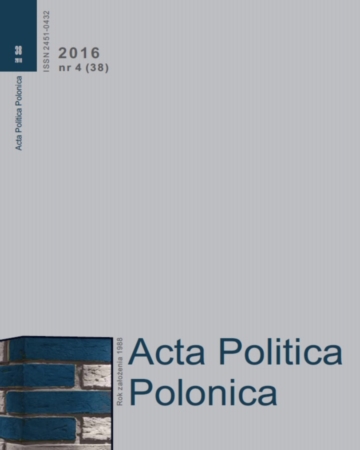
ISSN: 2451-0432
OAI
DOI: 10.18276/ap.2016.38-06





Lista wydań /
4/2016 (38)
Stanowisko reprezentantów Szkoły Austriackiej wobec działalności politycznej amerykańskich Republikanów w kwestiach ekonomicznych i wolności jednostek w II połowie XIX wieku
| Autorzy: |
Wojciech
Szabaciuk
Instytut Politologii, Uniwersytet Wrocławski |
| Słowa kluczowe: | Szkoła Austriacka Partia Republikańska Stany Zjednoczone |
| Data publikacji całości: | 2016 |
| Liczba stron: | 8 (81-88) |
Abstrakt
Niniejszy artykuł jest próbą analizy i interpretacji stanowiska reprezentantów Szkoły Austriackiej wobec działalności amerykańskich polityków Partii Republikańskiej w II połowie XIX wieku. Artykuł ten wykaże, że zdaniem przedstawicieli jednej z najbardziej radykalnych i bezkompromisowych szkół z dziedziny nauk społecznych i ekonomicznych Partia Republikańska była ugrupowaniem politycznym popierającym centralizację władzy, merkantylizm, subsydia dla wielkiego biznesu oraz realizację modelu państwa zgodnie z podzielanymi przez siebie przekonaniami religijnymi. Autor wykaże, że republikański prezydent Abraham Lincoln był krytycznie postrzegany przez badaczy Szkoły Austriackiej, którzy oskarżali go o ograniczenie wolności, w tym zwłaszcza ekonomicznej.
Pobierz plik
Plik artykułu
Bibliografia
| 1. | Aimar, T. (2009). Economics of ignorance and coordination Subjectivism and Austrian School of Economics. Northampton: Edward Elgar Publishing Limited. |
| 2. | Denson, J. (2006). A century of war Lincoln, Wilson and Roosevelt. Auburn: The Mises Institute. |
| 3. | Denson, J. (2001). A Lincoln and the first shot: a study of deceit and deception. W: J. Denson (red.), Reassesing the presidency The rise of executive state and the decline of freedom. Auburn: The Mises Institute. |
| 4. | diLorenzo, T. (2001). Abraham Lincoln and the triumph of mercantilism. W: J. Denson (red.), Reassesing the presidency The rise of executive state and the decline of freedom. Auburn: The Mises Institute. |
| 5. | diLorenzo, T. (2010). Jak kapitalizm zbudował Amerykę. Warszawa: Fundacja Pafere. |
| 6. | diLorenzo, T. (2012). Organized crime: The unvarnished truth about government. Auburn: The Mises Institute. |
| 7. | Gordon, D. (2007). The essential Rothbard. Auburn: The Mises Institute. |
| 8. | Higgs, R. (2011). The transformation of the American economy 1865–1914 an essay in interpretation. Auburn: The Mises Institute. |
| 9. | Huebert, J. (2010). Libertarianism today. Santa Barbara: Praeger. |
| 10. | Kirzner, I. (2001). Ludwig von Mises. Wilmington: ISI Books. |
| 11. | Kirzner, I. (1994). Value-freedom. W: P. Boettke (red.), Elgar companion to the Austrian Economics. Northampton: Edward Elgar Publishing Limited. |
| 12. | Mises von, L. (1998). Human action a treatise of economics. Auburn: The Mises Institute. |
| 13. | Raico, R. (2012), Classical economy and the Austrian School. Auburn: The Mises Institute. |
| 14. | Riggenbach, J. (2009), Why american history is not what they say: and introduction to revisionism. Auburn: The Mises Institute. |
| 15. | Rothbard, M. (1999). America’s just two wars: 1775 and 1861. W: J. Denson (red.), The costs of war: Americas pyrrhic victories. New Jersey: Transaction Publisher. |
| 16. | Schulak, E.M., Unterkofler, H. (2011). The Austrian School of Economics A history of its ideas, ambassadors, and institutions. Auburn: The Mises Institute. |
| 17. | Shaffer, B. (2012). The Wizards of Ozymandias reflection on the decline & fall. Auburn: The Mises Institute. |
| 18. | Sobolewska-Myślik, K. (2004). Partie i systemy partyjne na świecie. Warszawa: Wydawnictwo Naukowe PWN. |
| 19. | Soto de Jesus, H. (2008). The Austrian School Market order and entrepreneurial creativity. Cheltenham: Edward Elgar Publishing Limited. |
| 20. | Taylor, T. (1980). An introduction to Austrian Economics. Auburn: The Mises Institute. |
| 21. | Wagner, H. (2007). The U.S government how it works History of Republican Party. New York: Chelsea House Publisher. |